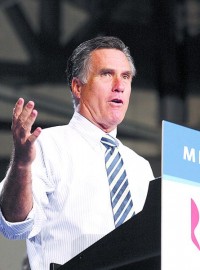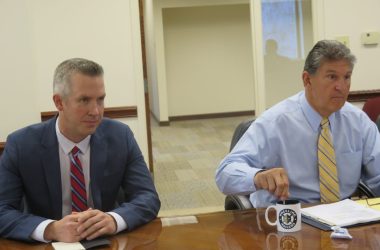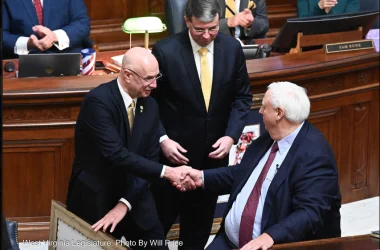
Mitt Romney
WHEELING, W.Va. — When Mitt Romney visits West Virginia on Tuesday to campaign for GOP Senate hopeful Shelley Moore Capito, he will become the latest in a flurry of nationally known politicians to visit the state to back their respective parties’ candidates for Congress this year.
And some believe there’s plenty more to come between now and November’s election.
In a span of about a month, West Virginia has played host to the Republican presidential and vice presidential nominees from 2012, a rising national star within the Democrat Party and the man second in line to succeed President Barack Obama.
On July 11, House Speaker John Boehner, R-Ohio, visited Wheeling, albeit quietly, for a little-publicized GOP fundraiser at Wheeling Park’s White Palace.
On July 14, Rep. Paul Ryan, R-Wis., came to Charleston to stump for Capito, on the same day Sen. Elizabeth Warren, D-Mass., spoke at a rally for Capito’s opponent, Natalie Tennant, in Shepherdstown. Romney, meanwhile, is scheduled to attend a fundraiser in Charleston before heading to a jobs rally in Beckley on Tuesday.
Ryan was Romney’s running mate during his 2012 presidential bid, and both Ryan and Warren are generating some presidential buzz within their respective parties for 2016. Their visits bring a lot of attention for a state that is 38th in population and is often seen as little more than a blip on the national political radar.
Not so this year, as leaders of both parties have identified the Capito-Tennant showdown as one key to which party will control the Senate come January. Democrats hold 55 of 100 seats in the Senate, so the GOP – which holds a comfortable majority in the House – needs to gain just six seats in the Senate to control both houses of Congress for the first time since 2007.
“The prediction is we’re going to have a lot more,” said Robert Rupp, a history and political science professor at West Virginia Wesleyan College. “We can expect visits by outside politicians to increase.”
Rupp said the Ryan and Warren visits in particular demonstrate that both parties are pulling out all the stops to win in November.
He noted both Capito and Tennant took something of a risk by bringing these people to the state to endorse them publicly.
“What’s interesting is that each of these prominent politicians had handicaps,” Rupp said. “Warren was seen by some as too liberal and supportive of Obama, and Ryan, there’s some concern over his budget (proposal) and what it would do to Social Security and other entitlement programs.”
According to Rupp, there’s no data to suggest big-name visits do much to sway voters one way or the other, but they do accomplish two things: They bring in lots of money and they energize the party’s base.
Rupp said researchers have identified three main factors voters take into account in choosing a candidate, each of which is basically equal in weight: party, personality and policy. That would seem to suggest having star power on one’s side to generate excitement about the election could bring in those voters who will pick candidates solely on the basis of whether they have a “D” or an “R” by their name.
But such campaign tactics sometimes serve to distract voters from what’s really important, according to Rupp.
“I think it simply detracts from the whole idea of what are the key issues and what are the candidates saying about them,” he said.
Tennant’s campaign was quick to criticize the announcement of Romney’s visit, pointing to a 2003 statement made while he was governor of Massachusetts regarding the coal-fired Salem Harbor power plant – identified as one of that state’s heaviest polluters: “I will not create jobs or hold jobs that kill people, and that plant – that plant kills people,” he said.
“The fact that Congresswoman Capito would align herself with someone who believes coal ‘kills people’ just to make a quick buck shows how quickly she will turn her back on West Virginia coal miners in favor of Wall Street dollars,” said Tennant spokeswoman Jennifer Donohue.
But Capito, in a statement released by her campaign, said Romney shares her commitment “to freedom, jobs and American exceptionalism.” She also pointed out Romney easily won all 55 of West Virginia’s counties in the 2012 presidential election.
“Gov. Romney’s support highlights the clear difference between my record of working for West Virginia families and my opponent’s record of supporting Obama’s anti-coal, job-killing policies,” Capito said.
To read more from The Intelligencer/Wheeling News-Register, subscribe here.





